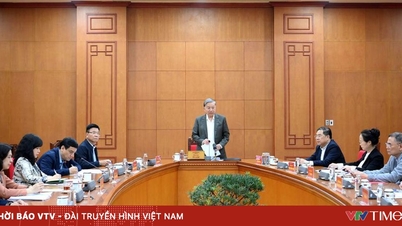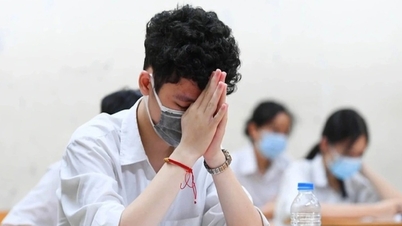The Decree, comprising 6 chapters and 29 articles, regulates the tuition fee framework, tuition fee collection and management mechanisms, policies on tuition fee exemption, reduction, and support, support for learning costs in educational institutions within the national education system, and service prices in the field of education and training.
The regulations on tuition fee frameworks (floor and ceiling levels) or tuition fee ceilings for different educational levels, and tuition fee schedules, are inherited from the provisions of Decree No. 81/2021/ND-CP and Decree No. 97/2023/ND-CP.
The objective is to ensure the stability of tuition fee policies, create proactive and convenient conditions for learners, educational institutions, and management agencies, while implementing a step-by-step roadmap to offset salary costs, direct costs, management costs, depreciation of fixed assets, and other costs as stipulated by law on pricing.
In addition to inheriting previous regulations, Decree 238/2025/ND-CP supplements and provides specific guidance according to Resolution No. 217/2025/QH15: (1) tuition fee exemption for preschool children, primary and secondary school students, and learners of general education programs at public educational institutions; (2) tuition fee support for preschool children, primary and secondary school students, and learners of general education programs at private and non-profit educational institutions is supported at the level stipulated by the Provincial People's Council, but not exceeding the tuition fee level of private and non-profit institutions.
The new decree also adds policies to encourage the development of high-quality human resources, meeting the human resource needs for new industries and economic breakthroughs in accordance with Resolution No. 57-NQ/TW, such as: Article 14 “Students pursuing specialized fields that meet the requirements of socio-economic development, national defense, and security as prescribed by the Law on Higher Education. The list of specialized fields is prescribed by the Government and the Prime Minister” and Clause 11, Article 15 “Students who are eligible for programs and projects that are exempt from tuition fees as prescribed by the Government and the Prime Minister”.
The method for providing tuition fee exemptions and support to students is regulated with a view to maximizing administrative procedure reform, specifically: preschool children and primary and secondary school students do not need to submit applications for tuition fee exemptions or support; at the same time, it stipulates that administrative procedures will be handled through the exploitation of existing electronic data in the National Population Database and other specialized databases, and adds the option of submitting applications through the national public service portal to facilitate students.
Implementation will begin in the 2025-2026 school year.
Based on Decree No. 238/2025/ND-CP, the Government assigns ministries, central agencies, local authorities, and educational institutions to urgently prepare all necessary conditions and resources to implement policies on tuition fees, tuition fee exemptions, reductions, and support, as well as support for learning costs and service prices in the field of education and training, starting from the 2025-2026 academic year, ensuring full and timely implementation.
Accordingly, those exempt from tuition fees are students pursuing specialized fields of study that meet the requirements of socio-economic development, national defense, and security as stipulated in the Law on Higher Education. The list of specialized fields of study is prescribed by the Government and the Prime Minister.
Those eligible for tuition fee exemption include:
1. Preschool children, primary and secondary school students, and learners in general education programs (students enrolled in continuing education programs at the lower secondary level and students enrolled in continuing education programs at the upper secondary level) in public educational institutions within the national education system.
2. Individuals as defined in the Ordinance on Preferential Treatment for People with Meritorious Contributions to the Revolution who are currently studying at educational institutions within the national education system.
3. Students with disabilities in vocational and higher education institutions.
4. Students aged 16 to 22 who are pursuing their first degree in higher education are eligible for monthly social assistance as stipulated in Clauses 1 and 2 of Article 5 of Government Decree No. 20/2021/ND-CP dated March 15, 2021, on social assistance policies for social protection beneficiaries. This also includes students at the intermediate and college levels who are orphans (having lost both parents) and have no one to rely on, as defined by the Law on Vocational Education.
5. Students enrolled in government-sponsored programs (including students enrolled in vocational training programs with a duration of 3 months or more) as stipulated by the Government's regulations on the government-sponsored program for higher education and vocational education institutions within the national education system.
6. Students of pre-university schools and pre-university departments.
7. Students studying at vocational and higher education institutions who are ethnic minorities and whose father or mother, or both parents, or grandparents (in the case of living with grandparents) belong to poor or near-poor households as defined by the Prime Minister.
8. Students majoring in Marxism-Leninism and Ho Chi Minh Thought.
9. Postgraduate students at the master's, doctoral, specialist level I, specialist level II, and resident physician levels in the fields of psychiatry, pathology, forensic medicine, forensic psychiatry, infectious diseases, and emergency resuscitation at public educational institutions in the health sector.
10. Students from ethnic minority groups with very small populations, as defined by the Government's regulations on policies for preschool children, students from ethnic minority groups with very small populations in areas with difficult or extremely difficult socio-economic conditions as currently stipulated by competent authorities.
11. Students who are eligible for programs and projects are exempt from tuition fees as stipulated by the Government and the Prime Minister.
12. Those who have graduated from lower secondary school can continue their studies at the intermediate level.
13. Students at intermediate and college levels, in fields and professions that are difficult to recruit for but are in demand by society, according to the list prescribed by the Ministry of Education and Training.
14. Students pursuing specialized professional fields and occupations that meet the requirements of socio-economic development, national defense, and security as stipulated in the Law on Vocational Education. These specialized professional fields and occupations are defined by the Government and the Prime Minister.
In addition, the decree specifies the categories of students eligible for tuition fee reductions and support ranging from 50-70%.

Ca Mau province allocates over 940 billion VND to implement a two-session-per-day schooling program.

Excitement builds as preparations are underway for the special opening ceremony.

Implementing the "contract farming" system in education.
Source: https://tienphong.vn/doi-tuong-nao-duoc-mien-hoc-phi-nam-hoc-2025-2026-post1775481.tpo





































![[Photo] Prime Minister Pham Minh Chinh attends the Conference on the Implementation of Tasks for 2026 of the Industry and Trade Sector](/_next/image?url=https%3A%2F%2Fvphoto.vietnam.vn%2Fthumb%2F1200x675%2Fvietnam%2Fresource%2FIMAGE%2F2025%2F12%2F19%2F1766159500458_ndo_br_shared31-jpg.webp&w=3840&q=75)








































































Comment (0)